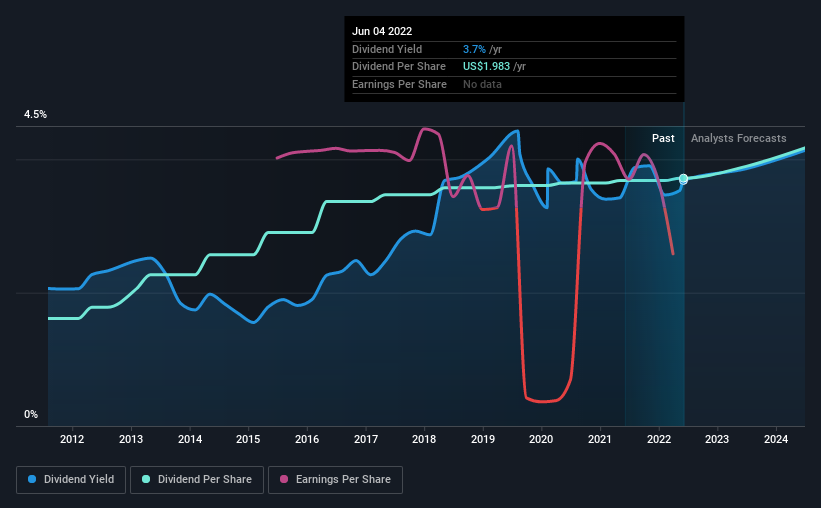Cardinal Health (NYSE:CAH) Is Paying Out A Larger Dividend Than Last Year
Cardinal Health, Inc. (NYSE:CAH) will increase its dividend on the 15th of July to US$0.50. This makes the dividend yield 3.7%, which is above the industry average.
View our latest analysis for Cardinal Health
Cardinal Health Might Find It Hard To Continue The Dividend
While it is great to have a strong dividend yield, we should also consider whether the payment is sustainable. Cardinal Health is unprofitable despite paying a dividend, and it is paying out 121% of its free cash flow. This is quite a strong warning sign that the dividend may not be sustainable.
Looking forward, earnings per share could 18.7% over the next year if the trend of the last few years can't be broken. This will push the company into unprofitability, which means the managers will have to choose between suspending the dividend, or paying it out of cash reserves.
Cardinal Health Has A Solid Track Record
The company has an extended history of paying stable dividends. The first annual payment during the last 10 years was US$0.86 in 2012, and the most recent fiscal year payment was US$1.98. This means that it has been growing its distributions at 8.7% per annum over that time. Companies like this can be very valuable over the long term, if the decent rate of growth can be maintained.
The Dividend Has Limited Growth Potential
Investors who have held shares in the company for the past few years will be happy with the dividend income they have received. However, things aren't all that rosy. Cardinal Health's EPS has fallen by approximately 19% per year during the past five years. Dividend payments are likely to come under some pressure unless EPS can pull out of the nosedive it is in.
The Dividend Could Prove To Be Unreliable
Overall, we always like to see the dividend being raised, but we don't think Cardinal Health will make a great income stock. We can't deny that the payments have been very stable, but we are a little bit worried about the very high payout ratio. We don't think Cardinal Health is a great stock to add to your portfolio if income is your focus.
Investors generally tend to favour companies with a consistent, stable dividend policy as opposed to those operating an irregular one. However, there are other things to consider for investors when analysing stock performance. For example, we've identified 3 warning signs for Cardinal Health (2 can't be ignored!) that you should be aware of before investing. Is Cardinal Health not quite the opportunity you were looking for? Why not check out our selection of top dividend stocks.
Have feedback on this article? Concerned about the content? Get in touch with us directly. Alternatively, email editorial-team (at) simplywallst.com.
This article by Simply Wall St is general in nature. We provide commentary based on historical data and analyst forecasts only using an unbiased methodology and our articles are not intended to be financial advice. It does not constitute a recommendation to buy or sell any stock, and does not take account of your objectives, or your financial situation. We aim to bring you long-term focused analysis driven by fundamental data. Note that our analysis may not factor in the latest price-sensitive company announcements or qualitative material. Simply Wall St has no position in any stocks mentioned.

 Yahoo Finance
Yahoo Finance 
